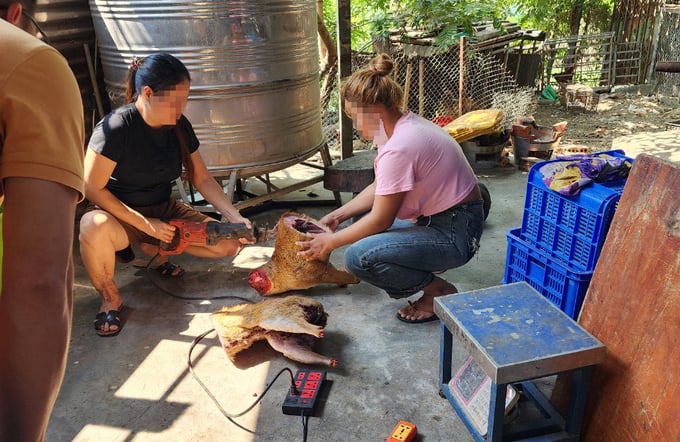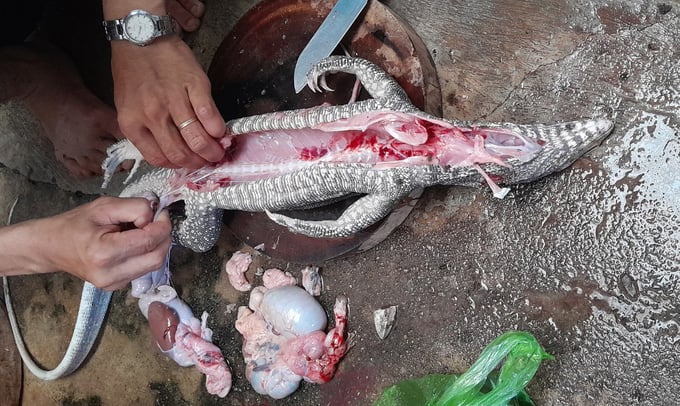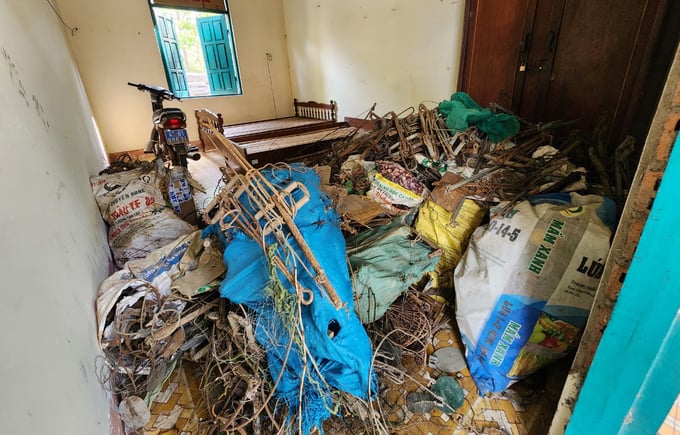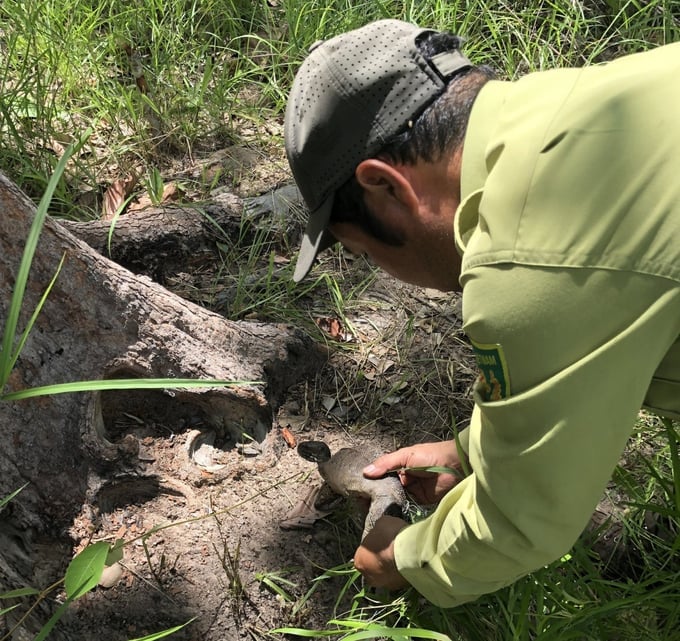May 21, 2025 | 04:19 GMT +7
May 21, 2025 | 04:19 GMT +7
Hotline: 0913.378.918
May 21, 2025 | 04:19 GMT +7
Hotline: 0913.378.918
Acting upon local guidance, we ventured to S.P. Restaurant in Krong Na commune, Buon Don district, Dak Lak – a renowned hub for wildlife trade. Hunters from Rang and Drang Phok villages routinely venture into the forest to capture animals, delivering their bounty to S.P. Restaurant for distribution.
Pretending to be a tourist, the reporter approached S.P. Restaurant, wanting to reserve a table for entertaining guests. Welcoming the reporter was a woman in her 40s, identified as P., purportedly the restaurant's owner.

Mrs. P. and her staff sell wild meats to customers for 230,000 VND/kg. Photo by Quang Yen.
Initially cautious, Mrs. P. hesitated to introduce rustic local dishes when presented with the scenario of a guest from Ho Chi Minh City seeking to experience Central Highlands specialties. However, upon sensing the reporter's willingness to indulge in exotic delicacies and spend generously, Mrs. P. began extolling a variety of wild animal specialties.
"Our restaurant offers bison, wild porcupines, weasels, and muntjacs. Furthermore, for animals like monitor lizards and cheetahs, advance booking is necessary as hunters rarely encounter such species," Mrs. P. disclosed.
Upon expressing interest in purchasing wild meat for personal processing, Mrs. P. provided a price breakdown: "Muntjac meat is priced at 230,000 VND/kg, wild porcupine meat exceeds 300,000 VND/kg, and bison meat is available at 290,000 VND/kg. Additional charges apply if you opt for restaurant processing."
When inquired about purchasing meat, Mrs. P. stipulated that buyers must acquire a quarter of the animal, emphasizing wholesale transactions over retail. Upon reaching a pricing agreement, Mrs. P. escorted us to the rear of the restaurant.
Here, a vast cold storage unit housed an assortment of frozen wild game meats preserved by the restaurant owner. Struggling to extract a sizable bison, Mrs. P. removed its head and intestines. Subsequently, wielding a saw, she painstakingly cut a quarter of the carcass and presented it to the customer, all the while instructing her female employee to exercise caution.

The axolotl, captured in Yok Don National Park and traded for meat, is listed in Vietnam's red book. Photo: Volunteer.
"Fret not, this bear was freshly caught by the hunter just yesterday. Its meat remains pristine, ensuring customers receive authentic fare unlike other establishments. I've been in the bushmeat trade for years, and not a single complaint has arisen," reassured Ms. P. to the reporter.
However, upon discovering the reporters taking photos, the restaurant owner hastily discarded the saw and demanded the deletion of the recorded clips and images. Refusal to comply resulted in the reporter being confined within the restaurant until compliance was assured. The reporter was permitted to depart upon deleting the aforementioned media and surrendering the phone.
Yók Don National Park oversees a natural forest area spanning 112,541 hectares across Dak Lak and Dak Nong provinces. Characterized by its dipterocarp forest ecosystem and flat terrain, the park harbors a distinctive fauna.
Research findings on the park's fauna reveal 33 species listed in the IUCN Red List 2020 and 40 species documented in the Vietnam Red Book of 2007. Among these, notable species include gaur, cobra, flying fox, and monitor lizard.

The room is about 10m2, but there are thousands of traps confiscated in Yok Don National Park. Photo: Quang Yen.
Consequently, the multitude of rare and endemic animals within Yok Don National Park not only boasts considerable diversity but also comprises numerous endemic and rare species warranting preservation. However, conservation efforts face significant challenges, primarily from illegal hunting and trapping activities and the gradual degradation of animal habitats due to adverse environmental shifts.
Upon arriving at Yok Don National Park, when the reporter expressed interest in learning about wildlife management and protection, park rangers promptly guided them to an area housing confiscated traps.
In a modest room measuring approximately 10 square meters, thousands of traps confiscated by forest rangers during their patrols and forest protection efforts are stored. Predominantly consisting of wire traps and spring traps, these devices are primarily deployed to capture ungulates such as pigs, muntjacs, and weasels.
These traps are strategically positioned near streams, ponds, and lakes, where water sources attract frequent animal activity. According to Yok Don National Park's records, in 2023 alone, the unit removed a total of 372 animal traps of various types. Similarly, within the first three months of 2024, the unit eliminated 312 animal traps.
During patrols, forest rangers often encounter wild animals ensnared in these traps. Healthy animals are promptly released back into their natural habitat, while those severely injured are transported for rehabilitation.
The traps are ingeniously placed, suspended from dry tree branches or discreetly positioned on the forest floor. As unsuspecting wildlife pass by, they trigger the traps, prompting their captors to track the animals by following the telltale signs on the ground.
Mr. Pham Tuan Linh, Director of Yok Don National Park, highlighted the unit's multifaceted approach to surveillance and undercover operations aimed at swiftly identifying individuals setting traps and engaging in illicit wildlife hunting and trade. Despite these efforts, Mr. Linh conceded that while the park has intensified security patrols and implemented various measures, effectively curbing unauthorized entry into the forest for animal hunting remains a persistent challenge.
Mr. Linh recounted a recent incident involving six individuals, three of whom were armed with guns, illicitly entering the park to hunt. Although forest rangers did not directly apprehend them, they promptly reported the incident to the Buon Don District Police for further investigation and legal action.

Yok Don National Park staff removing trapped animals. Photo: Thanh Hoa.
"Presently, the most significant challenge lies in individuals' sudden and covert trapping and capturing of animals. When carrying traps, perpetrators swiftly discard them upon sensing any movement and flee, making apprehension exceedingly challenging.
In pursuit of effective management strategies, the park has deployed camera traps to surveil areas frequented by animals, augmenting patrol efforts. During the dry season's peak, park personnel are deployed along rivers, streams, and water holes to intercept hunting activities promptly. While the current workforce adequately supports patrol and trap removal endeavors, the sheer expanse of the area presents formidable challenges. On average, each ranger oversees 700 to 800 hectares of forest, making comprehensive control exceedingly challenging.
The park boasts a rich biodiversity comprising rare species such as cobras, lizards, flying foxes, deer, and wild elephants. The park will continue reinforcing patrols and conducting awareness campaigns to foster community engagement in protecting wildlife, particularly rare species," Mr. Linh emphasized.
Translated by Quynh Chi

(VAN) Japan's grant aid project contributes to capacity building, promoting organic agricultural production, and fostering sustainable community development in Dong Thap province.

(VAN) For years, the CRISPR-Cas9 genome technology has been reshaping genetic engineering, a precision tool to transform everything from agriculture to medicine.

(VAN) Vietnam aims to become a 'leader' in the region in the capacity and managing effectively soil health and crop nutrition.
![Reducing emissions from rice fields: [Part 1] Farming clean rice together](https://t.ex-cdn.com/nongnghiepmoitruong.vn/608w/files/news/2025/05/05/z6509661417740_a647202949c539012a959e841c03e1d3-nongnghiep-143611.jpg)
(VAN) Growing clean rice helps reduce environmental pollution while increasing income, allowing farmers to feel secure in production and remain committed to their fields for the long term.
/2025/05/19/5136-1-144800_230.jpg)
(VAN) The Nghe An Provincial People's Committee has just approved the list of beneficiaries eligible for revenue from the Emission Reductions Payment Agreement (ERPA) in the North Central region for the year 2025.

(VAN) 14 out of 35 domesticated elephants in Dak Lak province have had their living conditions improved, with 11 of them currently participating in the non-riding elephant tourism model.

(VAN) Muong Nhe Nature Reserve hopes that being upgraded to a national park will lay the foundation for forest protection efforts to be carried out in a systematic, modern, and sustainable manner.